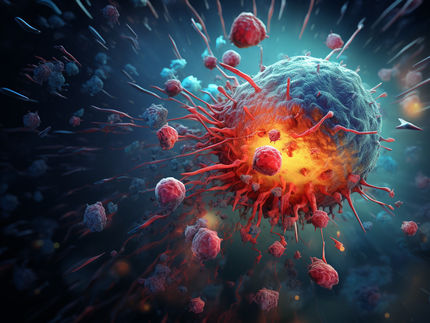Stockholm-based biotech start-up aims to develop the next generation of cell therapies
Neogap Therapeutics' PIOR technology identifies targets for personalised liver cancer immunotherapies
A new study published in the scientific journal Gut examines how immune system T cells respond to tumours in patients with advanced liver cancer (HCC). Using Neogap Therapeutics' PIOR® software platform, the researchers have identified tumour-specific mutations, which may contribute to the development of personalised immunotherapies.

Ola Nilsson, co-author of the study, and Kristine Bylund in Neogap Therapeutics' lab. The study in Gut explores how tumour-specific neoantigens are identified and activate T cells for cancer treatment.
Neogap Therapeutics
T cells are central to the body's defence against cancer but can also contribute to an immunosuppressive environment within the tumour. The study analysed T cells from the liver, lymph nodes, and tumour tissue to identify the most reactive cells to cancer-related neoantigens—tumour-specific proteins formed through mutations that can activate the immune system. Bioinformatic analysis identified 542 potential neoantigens from seven patients, 14 of which were found to induce a strong immune response, particularly in T cells from the liver and lymph nodes.
By using PIOR®, the researchers were able to identify neoantigens capable of activating T cells, which in turn can attack the tumour.
“The results demonstrate that PIOR® can effectively identify neoantigens with potential for future therapeutic applications,” says Associate Professor Anna Pasetto, a researcher at Karolinska Institutet and one of the lead authors of the study. “Data-driven analysis of neoantigens is an important component of the new generation of personalised cancer immunotherapies.”
The findings show that T cells from the liver and lymph nodes have properties that may be particularly suitable for future immunotherapies.
“This study aligns with Neogap's vision to develop the next generation of cell therapies,” says Ola Nilsson, Head of Neoantigen Production, Development & Clinical Processing at Neogap and co-author of the study. “PIOR® plays a key role in our efforts to identify the most promising neoantigens—an essential part of the development of future precision therapies.”
The study provides deeper insights into how T cells respond to neoantigens.
“Our findings reinforce the idea that T cells from lymph nodes may be particularly valuable as source material for generating reactive T cells—an approach already applied in Neogap's ongoing clinical trial in colorectal cancer, which specifically uses lymph nodes as starting material. These discoveries could have a significant impact on both research and the development of new treatments”, says Ola Nilsson.
Original publication
Panagiota Maravelia, Haidong Yao, Curtis Cai, Daniela Nascimento Silva, Jennifer Fransson, Ola B Nilsson, Yong-Chen William Lu, Patrick Micke, Johan Botling, Francesca Gatto, Giulia Rovesti, Mattias Carlsten, Matti Sallberg, Per Stål, Carl Jorns, Marcus Buggert, Anna Pasetto; "Unlocking novel T cell-based immunotherapy for hepatocellular carcinoma through neoantigen-driven T cell receptor isolation"; Gut, 2025-1-19
Other news from the department research and development
Most read news
More news from our other portals
Something is happening in the life science industry ...
This is what true pioneering spirit looks like: Plenty of innovative start-ups are bringing fresh ideas, lifeblood and entrepreneurial spirit to change tomorrow's world for the better. Immerse yourself in the world of these young companies and take the opportunity to get in touch with the founders.























































